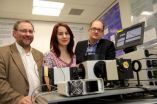(Press-News.org) Church attendance in western democracies has declined; yet, a new University of Missouri study shows religious beliefs still influence people at the polls.
Chris Raymond, a graduate instructor of political science in the MU College of Arts and Science, said that many political experts consider voters around the world as "floating without party loyalties," and that religion does not influence voters. Raymond's new study says religion still has a large impact on how people vote and helps define many of the platforms represented in the party system.
In the study, Raymond compared church attendance to other categories such as income, union membership and education and found that religion still matters for a sizable number of voters. By comparing the findings of the United Kingdom, the United States and Germany, Raymond discovered that even as the countries had different degrees of religious attendance, the religious beliefs still had a high level of influence.
The three countries were selected because they each represented a different trend regarding religious voting, or voting based on religious beliefs: people in Germany are perceived to be moving away from religious voting; the United States is experiencing a rise in religious voting; and religious voting in the United Kingdom has held steady. When compared to the 1960s – an era during which experts say voting behaviors began to change – religious voting has shown an "enormous degree of persistence," Raymond said.
"The literature indicated that these countries had become more secular, and scholars have said that religious voting 'no longer mattered,' but this study shows that is not the case," Raymond said. "Regardless of the trends, religiosity remains on par with class issues as far as why people vote. In fact, I argue that religion is No. 2 to social status."
Raymond explains that each country currently has specific political issues that may encourage voting affiliated with religious beliefs. He cites abortion rights in the United States, state funding of churches in the United Kingdom and issues related to Muslim integration in Germany as primary examples. These issues and their alignment to strong religious beliefs impacts voter turnout, he said. Religious voting also tends to favor conservative parties, because those social values tend to correspond with traditional conservative political values.
"It's important to understand that religion isn't the only factor, but an important one," Raymond said. "This makes sense because as a person with a vote, my religion and my class are how I perceive the world."
The results were published in the journal Electoral Studies.
INFORMATION:
Religion continues to impact voter decision, MU study finds
Church attendance down in Western democracies, but religious beliefs still motivate voters
2011-04-24
ELSE PRESS RELEASES FROM THIS DATE:
Phase 3 trial finds no benefit from atrasentan added to chemo for advanced prostate cancer
2011-04-24
ANN ARBOR, MICH. -- A Data and Safety Monitoring Committee (DSMC) has determined that patients in a phase III clinical trial given atrasentan in addition to a standard chemotherapy regimen for advanced prostate cancer did not have longer survival or longer progression-free survival than patients on the same chemotherapy regimen who got a placebo rather than atrasentan.
Almost 1,000 patients who had advanced, hormone-refractory prostate cancer were given up to 36 weeks of chemotherapy with docetaxel and prednisone. These patients were randomized so that one half got an ...
Acupuncture relieves hot flashes from prostate cancer treatment
2011-04-24
Acupuncture provides long-lasting relief to hot flashes, heart palpitations and anxiety due to side effects of the hormone given to counteract testosterone, the hormone that induces prostate cancer, according to a study published in the April issue of the International Journal of Radiation Oncology•Biology•Physics, an official journal of the American Society for Radiation Oncology (ASTRO).
The main treatments for men with metastatic prostate cancer are either surgery or hormone therapy to significantly reduce the level of testosterone in the body. Eliminating testosterone ...
Simple fungus reveals clue to immune system protection
2011-04-24
A discovery by Johns Hopkins scientists about how a single-celled fungus survives in low-oxygen settings may someday help humans whose immune systems are compromised by organ transplants or AIDS.
A report on the discovery in a yeast called Schizosaccharomyces pombe appears April 22 in Molecular Cell.
Previous work by the Hopkins team showed that Schizosaccharomyces pombe, a model organism that's often used to study individual genes, contains a protein named Sre1 that allows the organism to adapt to conditions in which oxygen is very low or missing altogether.
To find ...
Berkeley Lab study finds that photovoltaic systems boost the sales price of California homes
2011-04-24
Berkeley, CA– New research by the U.S. Department of Energy's (DOE) Lawrence Berkeley National Laboratory finds strong evidence that homes with solar photovoltaic (PV) systems sell for a premium over homes without solar systems.
"We find compelling evidence that solar PV systems in California have boosted home sales prices," says the lead author Ben Hoen, a researcher at Berkeley Lab. "These average sales price premiums appear to be comparable with the average investment that homeowners have made to install PV systems in California, and of course homeowners also benefit ...
Scientists observe single gene activity in living cells
2011-04-24
April 21, 2011 − (BRONX, NY) − Researchers at Albert Einstein College of Medicine of Yeshiva University have for the first time observed the activity of a single gene in living cells. In an unprecedented study, published in the April 22 online edition of Science, Einstein scientists were able to follow, in real time, the process of gene transcription, which occurs when a gene converts its DNA information into molecules of messenger RNA (mRNA) that go on to make the protein coded by the gene.
Robert Singer, Ph.D., co-director of the Gruss Lipper Biophotonics ...
Severe obesity not seen to increase risk of depression in teens
2011-04-24
According to a new study, severely obese adolescents are no more likely to be depressed than normal weight peers. The study, which has been released online in the Journal of Adolescent Health, did find that white adolescents may be somewhat more vulnerable to psychological effects of obesity.
This three-year study – performed by researchers from the Center for Child and Adolescent Health Policy at MassGeneral Hospital for Children (MGHfC) and the Department of Public Health and Community Medicine at Tufts Medical School – analyzed the relationship between severe obesity ...
MIT: Development in fog harvesting process
2011-04-24
CAMBRIDGE, Mass. -- In the arid Namib Desert on the west coast of Africa, one type of beetle has found a distinctive way of surviving. When the morning fog rolls in, the Stenocara gracilipes species, also known as the Namib Beetle, collects water droplets on its bumpy back, then lets the moisture roll down into its mouth, allowing it to drink in an area devoid of flowing water.
What nature has developed, Shreerang Chhatre wants to refine, to help the world's poor. Chhatre is an engineer and aspiring entrepreneur at MIT who works on fog harvesting, the deployment of devices ...
Early warning system for Alzheimer's disease
2011-04-24
Scientists at the University of Strathclyde in Glasgow are developing a technique based on a new discovery which could pave the way towards detecting Alzheimer's disease in its earliest stages - and could help to develop urgently-needed treatments.
The technique uses the ratio of detected fluorescence signals to indicate that clusters of peptide associated with the disease are beginning to gather and to have an impact on the brain.
Current techniques are not able to see the peptide joining together until more advanced stages but a research paper from Strathclyde describes ...
Data miners dig for corrosion resistance
2011-04-24
A better understanding of corrosion resistance may be possible using a data-mining tool, according to Penn State material scientists. This tool may also aid research in other areas where massive amounts of information exist.
In data mining -- a branch of computer science -- computer programs categorize large amounts of data so they become more useful. Different types of data-mining programs can find correlations between data on specific subjects, or in different areas of a single subject. Data mining finds similarities and differences among data parameters that frequently, ...
HMV.com Announces Top Selling Movies, Games & Gadgets for April
2011-04-24
Online retailer HMV reveals the most popular gadgets, CDs, DVDs and video game titles available for pre-order and release during April through their online store at hmv.com.
Movies
The Girl Who Kicked the Hornets Nest DVD - Release date: 4th April 2011
The Girl Who Kicked The Hornets' Nest is the explosive final installment of Stieg Larsson's trilogy which began with The Girl with the Dragon Tattoo. Leading on from the conclusion of The Girl who Played with Fire, Lisbeth Salander (Noomi Rapace) is under police custody and about to face the murder trial that has ...
LAST 30 PRESS RELEASES:
Tiny flows, big insights: microfluidics system boosts super-resolution microscopy
Pennington Biomedical researcher publishes editorial in leading American Heart Association journal
New tool reveals the secrets of HIV-infected cells
HMH scientists calculate breathing-brain wave rhythms in deepest sleep
Electron microscopy shows ‘mouse bite’ defects in semiconductors
Ochsner Children's CEO joins Make-A-Wish Board
Research spotlight: Exploring the neural basis of visual imagination
Wildlife imaging shows that AI models aren’t as smart as we think
Prolonged drought linked to instability in key nitrogen-cycling microbes in Connecticut salt marsh
Self-cleaning fuel cells? Researchers reveal steam-powered fix for ‘sulfur poisoning’
Bacteria found in mouth and gut may help protect against severe peanut allergic reactions
Ultra-processed foods in preschool years associated with behavioural difficulties in childhood
A fanged frog long thought to be one species is revealing itself to be several
Weill Cornell Medicine selected for Prostate Cancer Foundation Challenge Award
Largest high-precision 3D facial database built in China, enabling more lifelike digital humans
SwRI upgrades facilities to expand subsurface safety valve testing to new application
Iron deficiency blocks the growth of young pancreatic cells
Selective forest thinning in the eastern Cascades supports both snowpack and wildfire resilience
A sea of light: HETDEX astronomers reveal hidden structures in the young universe
Some young gamers may be at higher risk of mental health problems, but family and school support can help
Reduce rust by dumping your wok twice, and other kitchen tips
High-fat diet accelerates breast cancer tumor growth and invasion
Leveraging AI models, neuroscientists parse canary songs to better understand human speech
Ultraprocessed food consumption and behavioral outcomes in Canadian children
The ISSCR honors Dr. Kyle M. Loh with the 2026 Early Career Impact Award for Transformative Advances in Stem Cell Biology
The ISSCR honors Alexander Meissner with the 2026 ISSCR Momentum Award for exceptional work in developmental and stem cell epigenetics
The ISSCR honors stem cell COREdinates and CorEUstem with the 2026 ISSCR Public Service Award
Minimally invasive procedure effectively treats small kidney cancers
SwRI earns CMMC Level 2 cybersecurity certification
Doctors and nurses believe their own substance use affects patients
[Press-News.org] Religion continues to impact voter decision, MU study findsChurch attendance down in Western democracies, but religious beliefs still motivate voters


